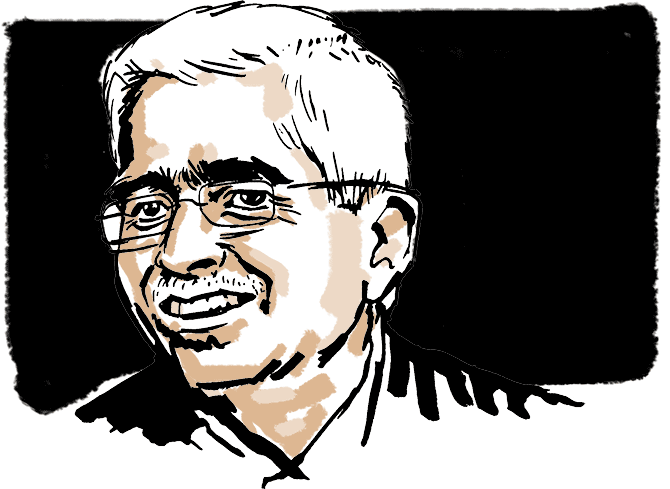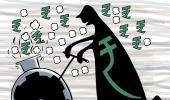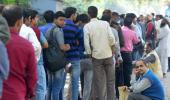'GST had to come close on the heels of demonetisation as part of the same package,' Shaktikanta Das tells Subhomoy Bhattacharjee.
Illustration: Dominic Xavier/Rediff.com

Though I had asked him for a meeting in June, just days after he retired as secretary, department of economic affairs in the finance ministry, Shaktikanta Das took his time.
With good reason. The past two years have seen a rash of policies, many of which are still playing out.
"I want some time to pass before commenting," he kept telling me. It turned out to be better that way, as we meet shortly before the first anniversary of demonetisation.
As he arrives at the refurbished The Deck at the India Habitat Centre, New Delhi, Das is clearly aware of the timing. "Look, this shouldn't be all about demonetisation, again." It is a fair request though I hope he brings it up himself as we get talking.
He tells me there have been quite a few lecture requests, but he has to turn them down as it is still close to his term at the DEA.
"Not just demonetisation but GST (goods and services tax), insolvency, bank recapitalisation and then there will be the ease of doing business bit (we spoke before the report came out). These are still playing out," he says.
The Deck looks roomy -- there are only a few people on this weekday afternoon. That impression is soon turned upside down.
As we sit with the bread basket, I see that agreeing on what to eat will not be a problem. A Bengali and an Odia would have similar tastes, so we order chicken pita pockets to munch on.
I pick the theme of the conversation: DEA secretaries often have to do a lot of speaking on camera as part of their job. How did he like that part?
"See, the finance ministry does not speak off the cuff. What has to be said is thought through, but no one goes into a huddle to decide all of it beforehand. If it is a critical issue, I will talk to the finance minister for advice before the cameras are switched on. Again, there have been cases when the minister himself has advised that a piece of news needs to be rebutted or contextualised."
It could now even be a tweet. "Once there was a report that the government was planning on a stake sale in SUUTI. I immediately tweeted to deny having any such idea."
Such communication is vital in economic affairs, he argues.
I have to bring up the 'D' word now. The communication must have peaked after November 8 last year, I let it slip.
Das chews meditatively before answering. "Demonetisation was a hugely difficult exercise. In terms of scale, it was one of the biggest challenges any Indian government has mounted. Once it was announced, I did have to take on a larger speaking role with the media. My aim was simple. The government had to give out the facts and make the public confident that things were in control and we would return to normalcy soon."
"Demonetisation, naturally, had impacted everyone in the country, so this constant communication was important to put the measures we were taking in perspective. For instance, we introduced indelible ink for those coming to exchange cash."
"We had evidence that a large number of people were being employed by those with unaccounted-for cash to make repeated trips to banks. As soon as we implemented the measure (ink marking on fingers), the queues became considerably shorter."
"We had to explain those things. And it wasn't as if I was the only one within the government doing the job of talking to the press."
Did the prime minister make any suggestions? Das makes it clear he will not take more questions on the topic.
In the past few years there have been a series of measures brought in by the government to address issues on the economic front. Was there any discussion about the sequencing of those steps?
"Let me give you an example from my stint as revenue secretary. We knew that we wanted to rework the double taxation agreements with countries from where a large amount of money comes to India or have been a favourable destination to fly out. But we had to take them up with Switzerland, with Mauritius or Singapore depending on the schedules on which these negotiations emerged."
"It was a combination of timing and opportunity. We might have wanted to order them differently but it wasn't possible."
The big bang steps for the domestic economy are broadly similar, he says. The government has to push in several directions to make the most impact.
Reforms cannot be linear, but sure enough, on some fronts the progress is faster.
"Their sequence may not appear clear from the outside, but every decision the government makes has a context and, of course, a follow through. You have to continuously evaluate if the economy needs it now or later."
During his time in the revenue department, there was plenty of clamour to make public the list of alleged tax evaders the Indian government had obtained from Switzerland. What pulled his hands back, I ask him.
"The terms are very clear. If we break the confidentiality clause, it is the end of our cooperation with those countries on sharing of information."
He says the details are to be used only for taxation purposes. Once the government has established there are valid reasons to chargesheet someone, it will become public since there will be a prosecution.
The Supreme Court and the special investigation team, too, bought this logic. They, too, have the list the names, he says.
I return to the topic of sequencing of policies.
Why was it necessary to bring in GST so close on the heels of demonetisation?
Does the economy need a larger breathing space to avoid the consequent slowdown?
"The sequencing was absolutely fine." A larger gap between the launch of GST and demonetisation would have hurt. Does it mean demonetisation was planned when the dates for GST were set?
Das carefully considers his response. "Any further delay in GST would have derailed it and GST had to come close on the heels of demonetisation as part of the same package. I would not like to say there was a grand plan."
"But a delay in GST meant the economy would pay a price."
But business has talked of hardships the government has glossed over, I add.
"It is a temporary dip and should smoothen out soon. When the going is good if we take any steps we risk being accused of interference (by business), but when things turn difficult there is a shout for us to come in."
Every retired secretary speaks about some part of his work with particular pleasure. Is there any one of these big bang measures that he is most pleased with?
Das looks at the now empty plate and decides he has had a heavy lunch. "No sweet dish," he announces as he nurses the lime juice. "It is difficult to recall any one, but let me tell you about a proud moment."
That proud moment took place at one of the annual Asian Development Bank meetings that happen every May.
"Often, the timing of the sessions collides with our Parliament schedule. So I had spoken on behalf of the finance minister at one of them. While the IMF (International Monetary Fund) and others spoke on the need for reforms and flagged several of those, I could reel off several from those grand checklists as already underway in India," he beams with pleasure.
One of those, he says, is the establishment of the Insolvency and Bankruptcy Code. "You will notice that even though we piloted the Bill, I got the minister (Arun Jaitley) to agree that its administration should be run by the ministry of corporate affairs."
"DEA should handle mostly policy issues, leaving sectors to be run by ministries, I feel," he says as he gets up to leave.
I figure we have not got around to discussing his stint as industry secretary in Tamil Nadu. He assures me that stuff is for another adda.












 © 2025
© 2025